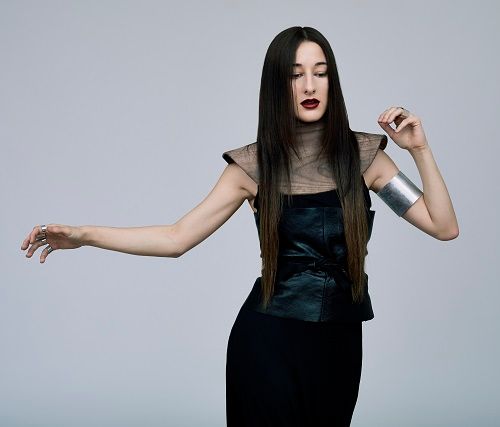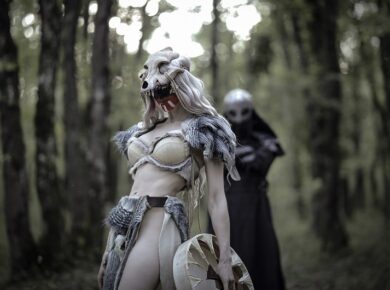
Interview collected by Tony Cannella
Questions by Miriam C. & Tony Cannella
 With her latest album “Taiga”, Zola Jesus (AKA Nika Roza Danilova) presents the listener with an eclectic potpourri of music that ranges from rock, pop, electronic, goth and more. It really is an interesting and entertaining listen. Recently we caught up with Nika to discuss “Taiga” and more.
Back in 2014, you released your fifth album, “Taiga”. What can you tell us about the making of the album?
With her latest album “Taiga”, Zola Jesus (AKA Nika Roza Danilova) presents the listener with an eclectic potpourri of music that ranges from rock, pop, electronic, goth and more. It really is an interesting and entertaining listen. Recently we caught up with Nika to discuss “Taiga” and more.
Back in 2014, you released your fifth album, “Taiga”. What can you tell us about the making of the album?
Well, first, I moved to this island called Vashon Island in Washington and I set up a studio in a house on the island. I just started writing every single day and tried to figure out what I wanted to do for my next record. I wrote so many songs and so many different types of songs. When I look back there was a theme running through many of the major songs that I had written and they all kind of tied together, and so I started following the trajectory of those songs and that was mostly lots of brass and beats and really clean vocals. The concept was about man’s relationship with nature, our alienation with nature and how we kind of separate ourselves from the world in our own way. It is kind of exploring that in a sonic and a lyrical way.
How do you feel that the media received “Taiga”?I don’t know, I think it was received well. I don’t know, I don’t really pay attention to that stuff.
The album itself is very eclectic and hard to categorize, so for anyone who has not heard it, how would you describe it?It’s hard to ask someone who their only way of expressing is through music to try to explain it in words. I would just explain it in terms I use: Brass, Drums, Electronic, and Strings. It’s kind of an electronic record, I think.
You worked with Dean Hurley – who is David Lynch’s music supervisor – how was working with him?It was incredible. He helped me give birth to the record. When you do everything by yourself you kind of work in a vacuum and it’s hard to get perspective, it gets to a point where you don’t even know what it is anymore, what the music is (laughs). It was good to have someone with fresh ears to help kind of oversee the finishing touches on a record that for so long was created in a vacuum.
With “Taiga”, you moved from the label Sacred Bones to your current label Mute. Why did you decide to change labels?It was just out of a curiosity to try something new. Sacred Bones is my family. We were so incredibly close and I was just really curious what it was like to work with a label where you had a little bit more – there was a little bit more distance. You know, one day I may go back to Sacred Bones, but for me this is just the best choice in terms of what else is out there in the world. I feel like if I wasn’t going to stay with Sacred Bones the only option would be Mute for me because I feel like I really, really respect their roster, their integrity and just the way that they run the label and how they treat their artists. Everything about Mute just felt like the right fit if it was not going to be Sacred Bones.

I don’t really think L.A. has affected the sound of the record. I wrote my last record, “Conatus” exclusively in L.A. and produced it there, so that one was very much more inspired by living in that city. The only thing that was very L.A. was the fact that I was producing and making a record with Dean in a little studio. We were at Westlake Studios, which is a famous recording studio that Michael Jackson recorded “Thriller” and Rihanna, Usher and all these pop stars recorded.
Speaking of “Conatus”… How do you feel that “Taiga” differs from that one, musically and lyrically?I think probably lyrically it’s not as different as I think it is. I’m always writing from the same perspective, so the lyrics are always going to be about the same things, just different aspects of those things. Musically for “Taiga”, I really wanted to try to avoid using synths, because I feel like I was leaning too heavily on them on the past couple of records. Also, emotionally making ““Taiga” I felt so much more liberated, whereas when I wrote “Conatus” there was a lot of tension, and emotional tension whereas“Taiga” was a little bit more about working through freedom or liberation and trying to access that.
What are your plans as far as touring goes?I would like to tour as much as possible on “Taiga” because I still really love performing those songs live. There are still a lot of places to go – I want to go to Asia and Australia. If I can go back to Europe, that would be great.
Let’s talk about your live show. What can fans expect when they come see you play live?I’m not going to have a whole brass ensemble, I had that for some shows, for this tour it’s not possible. I have a really good band that performs the songs so well, better than – I feel – that they are even on the record. The live show is so much more high energy than past shows. It is very intense – at least for me – it’s a very intense 60 minutes to an hour and fifteen minutes to be on stage. It’s really fun to engage with the audience and to really be on the ground, literally and communicating your music to people one by one, and looking them in the eyes and sending them the song right there immediately. That’s the best part about playing live and what I love about performing “Taiga” live.
I was checking out your video for the song “Hunger”. It is a really cool, unique video. What can you tell us about that?So many of my videos in the past are visual, which is something I really enjoy exploring. For “Hunger”, I wanted it to be very visceral and real. I wanted to explore the dichotomy in the physical sort of like manifestation of the hunger of the song and the lyrics and the emotional consequences of what I am trying to explore with that song. So much of it is about a feeling of desperation and a fear of death in a way where it is like; you are trying to live the right way. Every day you wake up you are trying to follow the right path, do the right thing, make the right choices, build your future and all of that can just become so overwhelming on your body that it makes you feel like you are going to explode because there is so much to be accountable for. That was just the physical representation of that.
Do you have any plans for other videos from this record?Yeah. I am actually in the early stages of working on my next video, which is going to be cool.
Well Nika, we’ve come to the end of the interview. Thank you so much for taking the time to do this. In closing, do you have any final words for your fans?I appreciate every single person that loves the record and connects with it, because even though you can create the music in a vacuum the minute you give it to the world it becomes public, it’s almost like public domain. You really hope that people benefit from it in some way. That is all you can hope for.
[youtube=http://www.youtube.com/watch?v=bMXaFE4GwQs&w=450&h=253]
Photo Credit
Zola Jesus’s second photo by Jeff Elstone
Links
facebook.com/zolajesusofficial
